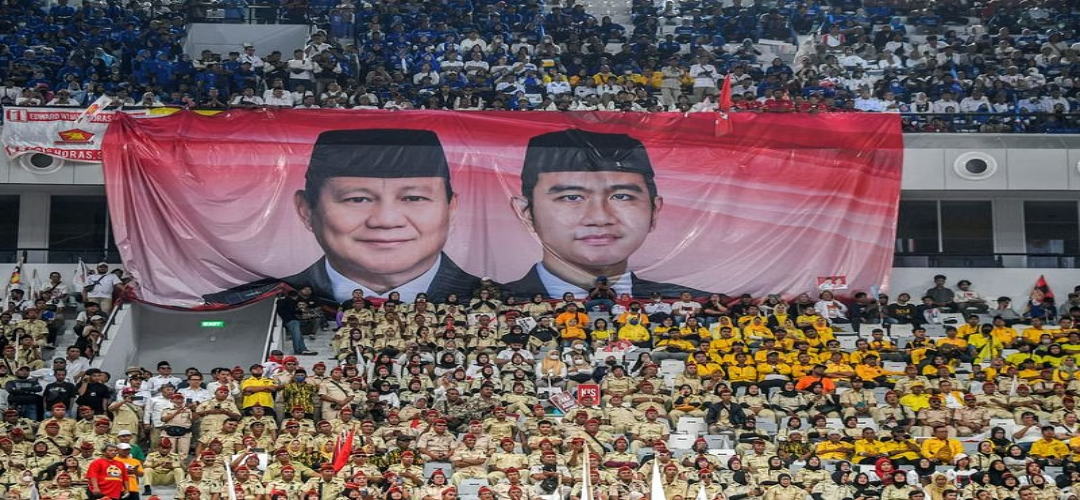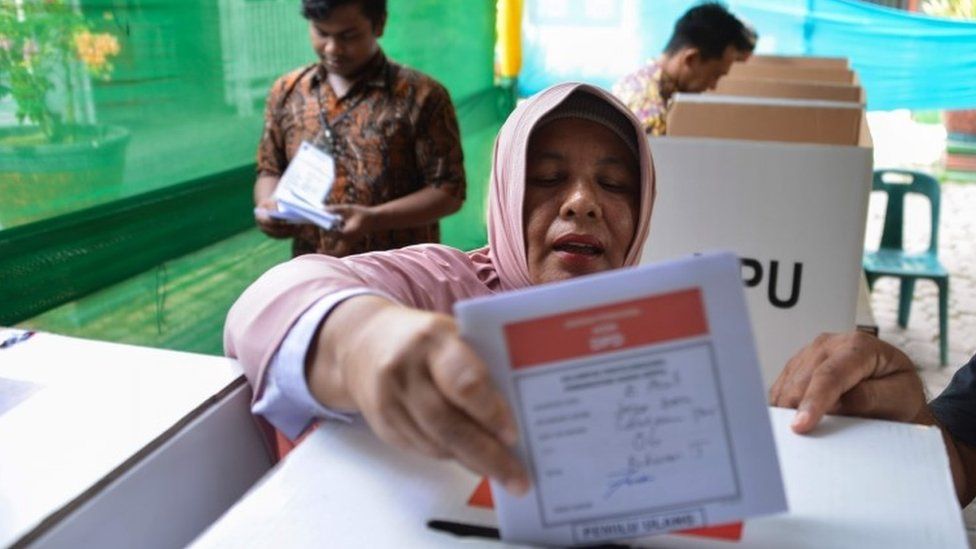Indonesia: The Road to Elections
November 25, 2023 | Expert Insights

Indonesia, the world's largest Muslim-majority nation, is on the precipice of a significant political transition as it approaches the 2024 presidential election. This electoral juncture not only shapes Indonesia's domestic affairs but also carries profound implications for its international relations, particularly with India.
As Indonesia votes on February 14, 2024, new political dynamics might unfold.
Background
The forthcoming election is anticipated to be a closely contested battle between the incumbent President Joko Widodo (Jokowi) and former Jakarta governor Prabowo Subianto. Jokowi, known for his infrastructure initiatives and social inclusivity, stands in contrast to Prabowo, a retired army general advocating a more assertive foreign policy. As these candidates vie for the nation's leadership, a spectrum of critical issues takes centre stage, spanning the economy, healthcare, education, and the persistent challenge of corruption.
The Indonesian electorate (Literacy rate 99.76% in 2021) is weighing the economic manifestos of the opposing camps with their promises of economic recovery and job creation for this 'Asian Tiger Cub,’ full recovery from the economic ravages of the COVID-19 pandemic remains elusive. Rising unemployment and increased poverty levels underscore the urgency for a robust economic strategy. Access to quality healthcare services and affordable education also emerge as pressing concerns, reflecting the populace's demand for candidates with concrete plans to address these challenges.
Additionally, corruption, a longstanding issue in Indonesia, remains a key focal point, with voters seeking candidates demonstrating a strong commitment to anti-corruption measures.

Analysis
A considerable segment of the electorate leans towards Prabowo's nationalist stance, in contrast to Jokowi's popularity, buoyed by his social welfare initiatives and pandemic response. The precarious electoral outcome underscores the dynamic nature of Indonesian politics.
The 2024 Indonesian presidential election, looming on the horizon, represents a continuation of the political landscape. Recent surveys suggest that Mr Jokowi maintains a marginal lead over Prabowo, thanks in part to the positive impact of his administration's measures to address the economic and social effects of the COVID-19 pandemic. Mr Jokowi's emphasis on social welfare initiatives, such as subsidised education and healthcare, has garnered support, particularly from rural and low-income communities.
Mr Prabowo, on the other hand, appeals to a distinct demographic with his focus on security issues and nationalistic rhetoric. His emphasis on traditional values and national sovereignty resonates with those who seek a resolute leader to protect Indonesia's interests and preserve its cultural heritage.
Despite President Jokowi's lead in recent surveys, the fluid and unpredictable nature of Indonesian politics introduces an element of uncertainty. Unforeseen events or shifts in public opinion could significantly alter the election's outcome.
Furthermore, the 2024 election marks a departure from previous processes, as Indonesian citizens will directly elect the president and vice president on a single ticket. This novel electoral system introduces an additional layer of unpredictability as voters assess the compatibility of vice-presidential and presidential candidates.
The result of the 2024 presidential election in Indonesia will profoundly affect the trajectory of the country's foreign and domestic policies. Demonstrating contrasting perspectives on the future of Indonesia, former military general Prabowo and incumbent Jokowi have placed the country at a critical juncture.
Jokowi has prioritised employment creation, infrastructure development, and poverty alleviation in his economic policies. In addition, he has executed social welfare initiatives aimed at enhancing housing, healthcare, and educational opportunities. Predicated on his re-election, Jokowi will likely retain his emphasis on social inclusion and economic expansion.
Conversely, Prabowo has espoused a protectionist economic stance, placing greater emphasis on self-sufficiency and the advancement of national interests. Additionally, he has committed to enhancing the defence capabilities of Indonesia and fostering a sense of national cohesion.
Jokowi has pursued an active foreign policy, fostering economic cooperation, security, and multilateralism through engagement with regional and international partners. Furthermore, he has endeavoured to bolster Indonesia's influence within regional institutions, including ASEAN and the G20. Prabowo has adopted a more prudent stance on foreign policy, placing domestic interests ahead of national sovereignty.
The Indonesian presidential election 2024 will determine the nation's domestic and foreign policy trajectories, constituting a momentous occasion for the country. The resultant consequences will profoundly affect Indonesia's economic progress, social welfare, regional involvement, and international alliances.
India-Indonesia Relations
India and Indonesia share a longstanding relationship rooted in cultural and economic ties, evolving into a strategic partnership in recent years. As the founding members of the Non-Alignment Movement (NAM), President Nehru and President Sukarno shared close ties, which were reflected in their diplomatic relations. As two nations with the largest Muslim populations in the world, both countries share a special relationship that has blossomed despite India’s secular constitution.
The historical ties are also based on a deeply shared cultural heritage with a mix of Hinduism, Buddhism and Islam that has influenced both countries' art, language and social customs.
However, the past is no guarantee for enduring ties in the present; the economy plays an important role. Both are the fastest-growing economies in the region and have shared interests in expanding their trade and investment relations. The two countries signed a Comprehensive Economic Partnership Agreement (CEPA) in 2011 to increase bilateral trade and investment. The CEPA has increased cooperation in various sectors, such as energy, pharmaceuticals, agriculture, and textiles.
In the geopolitical arena, India has always been supportive of Indonesia's territorial integrity and sovereignty, which is crucial for Indonesia's security and stability. It may be recollected that Indonesia was one of the three Islamic countries that attended the G20 meeting held in Srinagar this year, despite furious lobbying by Pakistan calling for a boycott of the venue by Islamic countries.
The unfolding 2024 Indonesian presidential election is closely monitored by India, recognising its potential impact on bilateral relations. India aims to sustain its robust ties with Indonesia, irrespective of the election outcome.
Both nations play pivotal roles in the region, aligning on shared objectives of regional stability. India's Act East policy, emphasising ties with Southeast Asian nations, aligns seamlessly with its deepening cooperation with Indonesia across defence, trade, and infrastructure.
A Jokowi re-election could ensure stability and continuity in bilateral relations, fostering further cooperation. His commitment to strengthening ties with India will likely persist, maintaining the positive trajectory. A Prabowo victory might introduce uncertainty into Indo-Indonesian relations. Prabowo's nationalist tendencies could lead to a more cautious approach, necessitating India's nuanced and adaptive response.
Assessment
- Despite the enduring ambiguities regarding the election result, both Jokowi and Prabowo have proclaimed their steadfast dedication to the national interests of Indonesia and the welfare of its populace. The strong basis of collaboration and mutual concerns between Indonesia and India establishes a resilient structure through which both countries can manoeuvre amidst the ever-changing terrain.
- The trajectory of Indonesia's future is profoundly influenced by its association with India, a significant regional power and close ally. With their shared objective of cultivating a robust and advantageous partnership, India and Indonesia are well-positioned to sustain their collaboration, thereby making substantial contributions to the stability and prosperity of the Indo-Pacific region.
- Regardless of the outcome of the 2024 Indonesian presidential election, India can reaffirm its dedication to strengthening relations with Indonesia.








Comments